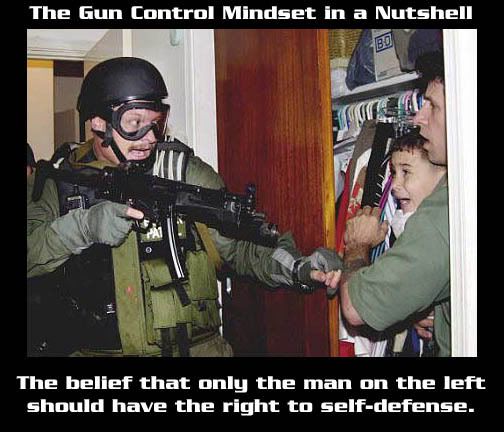"Firearms stand next in importance to the constitution itself. They are the American people's liberty teeth and keystone under independence … from the hour the Pilgrims landed to the present day, events, occurences and tendencies prove that to ensure peace security and happiness, the rifle and pistol are equally indispensable … the very atmosphere of firearms anywhere restrains evil interference — they deserve a place of honor with all that's good."
George Washington
If we're quoting George Washington, then this quoted letter deserves to be brought forth:
"To place any dependence on the Militia, is, assuredly, resting upon a broken staff. Men just dragged from the tender Scenes of domestic life; unaccustomed to the din of Arms; totally unacquainted with every kind of military skill, which being followed by a want of confidence in themselves, when oppsed to Troops regularly train'd, disciplined, and appointed, superior in knowledge and superior in Arms, makes them timid, and ready to fly from their own shadows...if I was called upon to declare upon Oath, whether the Militia have been most serviceable or hurtful upon the whole, I should subscribe to the latter."
-- George Washington in a private letter.So he's not terribly fond of the militia as a reliable fighting force either. Not that the opinions of George Washington have much relevance on the modern era. The nation and warfare has changed by leaps and bounds, which you seem to be failing to acknowledge.
First, the nation:
America just after the Revolution has a pathetically small standing army, ravaged and in ill supply after all the fighting with the British. It had a handful of ships in the entire navy. To the west were Native tribes none too happy about all the Europeans in their country. Shortly after the formation of the US, we had stuff like the Whiskey Rebellion spring up. With no real law enforcement and a tiny army, the militia was used to handle domestic disputes in a time of crisis. And that's about it. Not to fight off invaders or conquer a tyrannical government. And while the militia may have played some major roles in the occasional battle, the actual war was won by the regulars.
The role of the militia as originally thought of by some of the founding fathers no longer applies. They have no real function in society.
Second, the nature of war:
Falling on the Revolutionary War is not a very good way to back up your argument. The muskets used in the Revolution were not that much different from regular hunting rifles and the main tactic was to stand in a line in front of the enemy and shoot. They wore cloth jackets and tripoint hats instead of kevlar and helmets. It did not take much to train a regular army in the day. Because, again, the brilliant tactic was to stand in a line and shoot volleys at another army that stood in a line a few hundred feet away. Guerrilla tactics were not as common. The Army unquestionably ruled the land and all land operations.
Fast forward to the modern era. The role of the infantry has been shrinking ever since World War II. Soldiers are used to secure buildings, move in after devastation brought by advanced weaponry, parachute drop onto a location to complete a new phase in an operation, occupy conquered territory, or strike targets that are in too awkward or dangerous a place to hit with the big guns. They are no longer the dominating aspect of war, as was the case in the 18th century. Air power is presently the dominating factor. Without air superiority, you are screwed. Then comes the tanks and advanced artillery. Then things like SAM launchers and countermeasures. Then soldiers. You don't send the boys in first unless its for a very covert commando/Ranger style mission. And that's only if you have no real alternative.
And more importantly - soldiers are now packing advanced equipment rather than a musket and cloth uniform. It takes much, much longer to learn how to effectively use all of that equipment and put it to use in a team. Again with the US' motto of 'quality over quantity.' Just having a lot of armed civilians is ludicrous. And by the time such a revolution will likely occur (i.e.: years from now) the role of the infantry will be all the more focused and the equipment all the more advanced, thus increasing training time even more than at present. And that's not even counting how long it will take to train pilots and tank crews, which will be absolutely essential from the start of your war. Not a few months to a full year later.
The Gulf War is a good example of how war will be. In the first Gulf War, you had an entire country decimated and defeated in a very short time frame through use of aircraft, attack helicopters and tanks. Soldiers were after that. The current Gulf War was similar in its first days, but things passed to the soldiers when it came time to occupy. Which happened quickly.
Your militia forces can't shoot down an F-15 with an assault rifle or a Stinger launcher. And you aren't likely going to take the US military by surprise, as mentioned before. You need an Air Force and armored vehicles before you need soldiers or even militia forces if you want to stand a chance.
And what, may I ask, they defend themselves with? Weapons. And if the government has succeeded in a lot of restriction of these weapons, then it will be truly suicide.
When the Confederate states seceded, they acquired all military bases and equipment within their borders. Barring exceptions like Fort Sumter, but an isolated base in the middle of a now hostile state will not last long. As Sumter did not. The states will defend themselves with their local military equipment, not with a militia. And it will work much better.
They did not have a limited effect, they were the start. They were the first to resist the British and had major roles in Concord, Bennington, Saratoga, and Boston.
A militia isn't going to just remain a full blown militia, in the case of an actual attempt at a takeover, they would be the first to resist while trying to train an actual army. Such as the Americans did during the Revolution.
Again, the Revolutionary War is a greatly outdated example. Things moved slower. If the British had Panavia Tornado fighter jets at the time, we would be a commonwealth right now. And drink a lot more tea. A militia alone will not buy you enough time to train a modern army. You need another way to stall them.
As for "guncite.com" (not a biased sounding name in the least), yes, handguns will be much more common than assault rifles. They're much more readily available, cheaper, and easier to hide on one's person. However, criminals cannot buy assault rifles from underground organizations if they are exclusively sold to the military. Much like you can't buy an F-18 on the black market. It would remove them all together. Unfortunately, I agree that a ban on weapons is unrealistic. But only for the reason that guns made/sold before the ban would still be floating around in the criminal world. The only stuff that can feasibly be banned and avoid street usage are
future guns. Technology would then level the playing field as pre-ban guns were phased out by whatever police would carry by 2050. Like that corner-shot rifle.
Still, the Obama ban is not worth complaining about, because you can still legally strap a freakin' grenade launcher on your semi-automatic shotgun. You have it good.
Note: Also, remember not to post twice in succession. It's against the rules. Thank you.
























